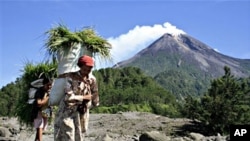Increased activity from Mount Merapi, one of Indonesia's most active volcanoes, is stirring fears of an imminent eruption.
Mount Merapi sits in a lush valley in Central Java. Last week, the volcano jumped to action. Since then the number of tremors have increased dramatically. So have streams of rock and hot gas known as pyroclastic flows.
The Volcanology and Geological Disaster Mitigation Agency on Monday put the area around the mountain on its highest alert status.
Surono, the head of the agency, says the activity is greater than was seen before the last eruption in 2006.
"This increase is very, very significant. And then I decided to upgrade the level of Merapi activity from the level three, to the level four," Surono said. "This is high alert."
Surono has asked the government to evacuate people living on the volcano. His agency is working with the local administration to prepare residents in the four districts most likely to be affected by an eruption.
After the 2006 blast, the geological agency began working with the government in the nearby city of Jogjakarta to educate people about Merapi's danger. The volcano is one of Indonesia's most active, and eruptions in 1994 killed more than 60 people.
Superheated gas was responsible for the two deaths caused in 2006. But this time the activity is different.
Scientists say the swelling of the mountain's slopes indicate the build up of high-pressure gas that could end in a major explosion. But it is the increase in seismic activity that worries Surono most.
"After the eruption in 2006 this is a period of eruption about every four years. So this is a normal activity in Merapi volcano," Surono said. "What's not normal is the number of earthquakes."
Heavy cloud cover has obscured the view of the volcano's summit, and Surono cannot predict when it will erupt or how violently.
Small eruptions occur on Mount Merapi every few years, and big ones come along once a decade. Because of the high frequency of activity, the government often waits to issue evacuation orders until it feels the threat is warranted. The regional disaster management board says more than 50,000 people live in the four districts surrounding the volcano.
In 2006 many people living on the volcano defied evacuation warnings, preferring to stay and protect their homes against theft.




